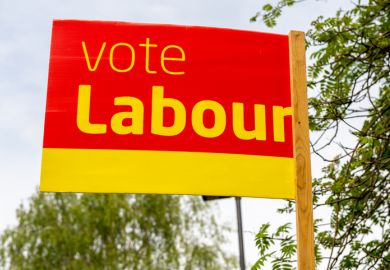Speaking at a Policy Exchange fringe event at the Labour Party conference last month, England’s shadow health secretary, Wes Streeting, declared that if Labour were to win the next general election, no one would get anything for free from Rachel Reeves and her Treasury team. “Every bit of investment”, he said, “comes with reform.”
As no one needs reminding, Labour has not committed to any higher education funding changes despite fixed tuition fees and high inflation. Moreover, it seems clear that any additional funds are likely to go first and foremost to students and graduates, in the form of extended maintenance grants and/or lower loan repayments for lower-paid graduates.
The most optimistic scenario for universities, therefore, is that, at some point during the first term of the next government (which polling suggests is indeed likely to be a Labour one), the economics will ease sufficiently to make more money available for institutions to use for teaching or research.
And that’s why, although Streeting – a former National Union of Students president – was speaking about the health sector, his words apply just as much to higher education. No one should expect that a newly flush government – say, in 2026 or 2027 – would simply raise tuition fees, or increase the Strategic Priorities Grant, or uplift research funding.
Instead, it is likely that ministers would want to extract from universities a series of new commitments in the interests of students. They may well take inspiration from a similar deal, the Universities Accord, between the government and institutions in Australia, which announced interim conclusions in July. Rather than launch another review focused narrowly on the funding system, they might wish to see wider systemic change.
A lot of the focus of an English Accord would probably be on immediate benefits to students, especially around value for money. One reform could be greater transparency about what tuition fees are used for and what students get in return. This was very hot in policy and political circles four or five years ago but has since died away a bit. Some universities provide rudimentary information on their websites, but little more. No student reads the TRAC returns.
Similarly, even a future Labour secretary of state might raise an eyebrow at the extent of employer contributions to the Universities Superannuation Scheme and might want to ensure that extra funds aren’t just spent on academic pensions.
Second, student experience. We might expect a future government to be more dirigiste over accommodation availability. Perhaps a university might be required to guarantee accommodation to all first-year students, including through clearing, and in the actual town or city where the university is based. Perhaps it could be allowed to expand places only alongside planning permission for more bed spaces; such stipulations could be extended to a looser commitment around postgraduates as well. Future governments might also have less sympathy with out-of-date IT systems and dilapidated estates.
Ministers could well seek to take action against the perceived crowding-out of domestic students by international ones, too. Several summers of negative attention around A-level results and increased numbers of 18-year-olds “missing out” on places might provoke a requirement for universities to maintain a certain ratio of home to international students – particularly if ministers were interested in indicating continued hawkishness around China.
Stronger action on course quality that goes beyond the very technical work undertaken by the Office for Students could also be politically attractive. It would not be inconceivable for the government to seek greater standardisation of curricula, assessment or both – leaning back into the regular political bunfight around the growth of first-class degrees and expressing a desire to give confidence in standards to students, parents and employers.
Universities are also likely to be obliged to make further progress on government priorities. If the lifelong learning entitlement (LLE) doesn’t achieve scale, we can expect further pressure here, beyond “please offer degree apprenticeships” and into the territory of, for example, making credit transfer easier, such that students can genuinely – not just in theory – stack qualifications from different institutions together. The government might also focus on greater sharing of facilities and engagement with local business and further education colleges.
Lastly, a Labour government, though less keen than the current administration to stoke culture wars, will nevertheless be tempted to address well-worn political bugbears, including senior staff pay and free speech.
Such a programme of potential action will not be easy for the sector. Many of the things listed above will jar, either because people disagree that these should be a focus or because, in principle, they might resent the implication that the government has the right to mandate them.
That said, there is also an opportunity here. Simply repeating calls for more funding, however well evidenced, seems not just ineffective but self-defeating. Might there be a reform package around which the sector could (mostly) coalesce, allowing it to proactively suggest a new Accord in exchange for higher fees or grant funding?
This would mark out a level of maturity and willingness to engage in this discussion, for mutual benefit. If so, then the sooner this work starts, the better.
Jonathan Simons is a partner and head of the education practice at Public First.
Register to continue
Why register?
- Registration is free and only takes a moment
- Once registered, you can read 3 articles a month
- Sign up for our newsletter
Subscribe
Or subscribe for unlimited access to:
- Unlimited access to news, views, insights & reviews
- Digital editions
- Digital access to THE’s university and college rankings analysis
Already registered or a current subscriber?








